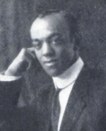|
|
 |
 |
|
Reading Guide |
| 2. |
Two Views
| - | Fenton Johnson, "Children of the Sun" and "Tired," poems, ca. 1915 |
|
|
 |
In historical analysis, it is easy to posit sides. How would Du Bois and Washington differ on Point A? What issue would most divide southern and northern whites in 1900? But history is still about people, persons, and persons struggle with mixed feelings about the times they live in and how they fit in. So before we continue, let us look at the struggle of one person, the black poet Fenton Johnson, as he deals with being a black man in white America in the 1910s.
Johnson was born into a middle-class African American family in Chicago. As a college student he pursued journalism and creative writing, and in the 1910s published short stories in The Crisis, produced several volumes of poetry, and founded two literary journals. James Weldon Johnson, in his 1921 collection The Book of American Negro Poetry, cites him as among the poets who "threw over the traditions of American poetry and became the makers of the 'new' poetry" after 1910. Consider these two poems in the light of others in this seminar, including Horton's "Song of Liberty," Dunbar's "We Wear the Mask," and Johnson's "Fifty Years." How does the black man strive forward? Where does hope lie? And the fear of fears: what if he loses hope? Fenton Johnson "fell silent" after 1921, James Johnson writes, and produced no more poetry for over ten years. 2 pages.
Discussion questions
- How do Johnson's two poems differ in tone, style, and meaning? What marks them as the work of one person?
- How does Johnson's call for "Liberty!" differ from George Horton's welcome of "Liberation, O! how glorious" in "Song of Liberty" in 1865? What is the function of martial imagery in their poems?
- Compare "Children of the Sun" and James Johnson's "Fifty Years." Where do black Americans find resilience and hope? How much must they depend on their personal resources?
- What does Johnson mean that he is "tired of civilization?" Consider how black leaders of this time used the word civilization as a gauge of progress, even as a call to action.
- How do black Americans face the loss of hope? face despair? Are they the same?
|
» Link |
 |
 |
Topic Framing Questions
| • |
What gains and setbacks mark the period of 1907 to 1917 for black Americans? |
| • |
To what extent did African Americans set their own paths forward? |
| • |
How were the lives of ordinary black people affected by black and white leadership? |
| • |
What identity had African Americans created, as a group, between 1865 and 1917? |
| • |
What insights could black Americans take forward into the postwar years and the 1920s?
|
|
|
 |
 |
|
 |
